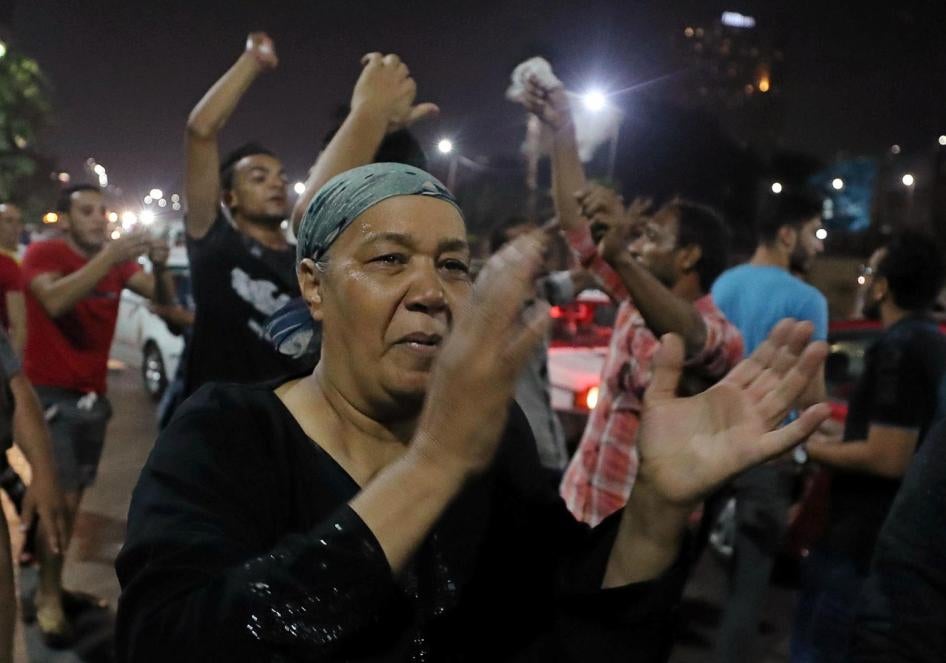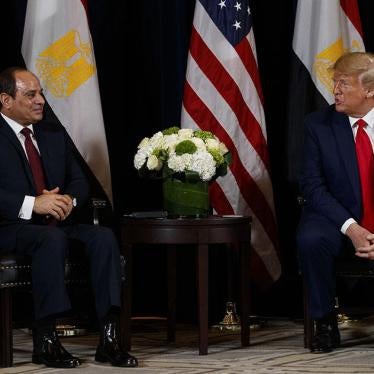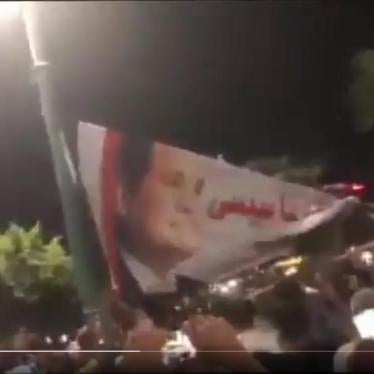(Beirut) – Egyptian authorities have arrested nearly 2,000 people in a sweeping nationwide crackdown following anti-government protests that erupted on September 20, 2019. Authorities acknowledged only 1,000 arrests.
The authorities have blocked news and political websites and interrupted other internet services that protesters relied on to communicate and document government abuses. The authorities should pledge to respect the right to peaceful assembly by allowing protests, applying nonviolent means to respond before resorting to the use of force, and taking measures to prevent violence between opposing protesters. The government should release all those arrested solely for peacefully exercising their rights and should stop interfering with news sites and internet services.
“The government’s mass arrests and internet restrictions seem intended to scare Egyptians away from protesting and to leave them in the dark about what’s happening in the country,” said Sarah Leah Whitson, Middle East and North Africa director at Human Rights Watch. “The nationwide crackdown on protests suggests that President Abdel Fattah al-Sisi is terrified of Egyptians’ criticisms.”
The protests erupted with demonstrators calling to stem corruption and demanding that al-Sisi step down. Mohamed Ali, a contractor who worked for the army for years and now lives in Spain in self-imposed exile, helped spark the protests by posting widely watched Facebook videos exposing alleged government corruption. He called for new protests on September 27.
The mass arrests may be the most sweeping the government has made since late 2013, Human Rights Watch said. Security forces have dramatically escalated mass arrests, with reports from Egyptian rights organizations that about 2,000 people have been arrested since September 20. The Egyptian Center for Economic and Social Rights said that prosecutors ordered at least 977 of them detained “pending investigations.” Security forces have held incommunicado an additional 920 who have not yet appeared before prosecutors, all apparently for alleged connections to the protests. The government also arrested a number of politicians and journalists in the sweep.
Those detained include 68 women and an unknown number of children, human rights lawyers reported. A lawyer told Human Rights Watch that the security forces released a number of detainees, including several children.
The Interior Ministry said in a statement on September 26 that it “will confront with utmost firmness and determination attempts at undermining stability and social peace.” The Prosecutor General, Hamada al-Sawy, said in a statement around 10 p.m. on September 26 that prosecutors interrogated 1,000 people in relation to the protests since September 20, but he did not say how many have been detained in total.
While the authorities arrested some people who were protesting on the streets, many were arrested at their homes days later. The government also has deployed uniformed and plainclothes security officers in Cairo, Alexandria, and other cities in and around main streets and squares, randomly stopping passersby, searching and questioning people, and forcing them to show the contents of their mobile phones and social media accounts. They have arrested people with antigovernment songs, slogans, or posts on their phones, lawyers said.
Lawyers for detainees have posted on their social media pages several accounts of security forces arbitrarily arresting many people merely for being in the “wrong place at the wrong time” or possessing critical content on their phones, and later charging them with participating in the protests.
The government is holding hundreds of detainees in the National Security Agency’s secret detention centers and in the camps of the Central Security Forces, Egypt’s riot police, both of which are illegal detention sites that lawyers cannot visit. A lawyer told Human Rights Watch the detention camps include al-Darrasa, al-Gabal al-Asfar, and al-Salam Central Security Forces’ camps in and around Cairo.
Two lawyers told Human Rights Watch that the authorities have refused detainees held in these places access to lawyers or family members. Lawyers only see detainees when authorities send them, in large numbers, to State Security Prosecution, where prosecutors interrogate them and order them detained without judicial orders.
International law requires the authorities to take all detainees before a judge promptly, normally within 48 hours, to review their detention. Under Egyptian law, which does not meet international standards, State Security Prosecutors may keep detainees in pretrial detention for months without judicial review.
Detainees are facing a range of charges including “joining a terrorist group,” protesting without permission, and disseminating false news, lawyers and news reports said.
Lawyers also raised concerns that government authorities have deprived detainees of food, medicine, and medical care, including urgently needed cancer treatment and psychiatric medications.
Government and pro-government media have portrayed the protests as a conspiracy by foreign intelligence agencies, the Muslim Brotherhood, and terrorist groups. They have apparently arbitrarily arrested at least nine foreigners – one Dutch, one Tunisian, one Sudanese, one Thai, two Turkish, and three Jordanian nationals. A pro-government television anchor, Amr Adeeb, aired videos showing the men “confessing” to having cameras and taking photos in or near Tahrir Square, or in downtown Cairo, or of criticizing the government.
The government also expanded its harassment of journalists, lawyers, and independent political figures. Among those arbitrarily detained are several lawyers who were assisting detainees such as Mahinour el-Masry and Sahar Ali, and at least three journalists who were reporting on the protests, Egyptian rights groups said.
On September 25, security forces arrested two well-known political science professors, Hassan Nafaa and Hazem Hosny, and Khaled Dawood, an opposition figure and long-time journalist, lawyers said. The government also arrested around two dozen prominent opposition leaders and activists from various backgrounds, such as Kamal Khalil, a leftist, and Magdy Korkor, an Islamist. The journalists and other well-known figures are facing charges similar to what those protesters are facing, the reports said.
News reports citing anonymous pro-government sources have said that the Interior Ministry’s National Security Agency and the General Intelligence have instructed al-Sisi supporters, including leaders of pro-Sisi political parties and directors of government companies, institutions, and ministries to gather employees and followers to show support for al-Sisi on September 27. A few parliament members of the Nation’s Future Party, one of the main pro-Sisi parties, and celebrity figures called for pro-government protests on that day close to Hesham Barakat’s Square (formerly known as Raba’a al-Adawiyya Square) in eastern Cairo. Reports said that the officials promised people free transportation and meals to “celebrate” the army and the president. News reports also said that security forces instructed imams in government-controlled mosques to dedicate Friday prayer speeches to supporting the government.
The authorities have blocked and interrupted various internet services and websites, internet monitoring groups reported. The authorities have restricted access to the BBC’s Arabic website, US-based Alhurra News, and Facebook Messenger. Netblocks, a group that monitors internet disruptions, said that access to Twitter had become intermittent in Egypt as of the evening of September 22, with almost 40 percent of users experiencing difficulty connecting to social media platforms. Experts also said that authorities blocked Signal and Wire, two secure communication apps.
The recent steps to interfere with access to information is in addition to the nearly 600 websites, including major independent news and human rights websites, that it has blocked since May 2017. These include, for example, the websites of the Egypt Independent, Mada Masr, al-Manassa, and Human Rights Watch.
There are serious concerns that the government may shut down the internet and telecommunication services in the whole country, as then-President Hosni Mubarak’s government did in response to 2011 protests, or to entirely block Facebook and Twitter and other websites. Such action would carry and cause millions of dollars in business losses. Egyptian courts did not hold Mubarak or his officials accountable for cutting telecommunication services in 2011, despite evidence presented by lawyers of mass damage.
In July 2016, the United Nations Human Rights Council passed a resolution condemning measures by countries to prevent or disrupt online access and information and called for free speech protections under articles 19 of the Universal Declaration of Human Rights and the International Covenant on Civil and Political Rights. In their 2015 Joint Declaration on Freedom of Expression and Responses to Conflict Situations, UN experts and rapporteurs declared that, even in times of conflict, “using communications ‘kill switches’ (i.e. shutting down entire parts of communications systems) can never be justified under human rights law.”
Human Rights Watch reiterates its call to Egypt’s allies, particularly European Union countries and the United States, to suspend military assistance to the government until it ceases its gross violations of international law. Concerned governments should urge the al-Sisi government to respect the rights of protesters to express their views, stop blocking news and information on the internet, and release all those unjustly detained.
“While President al-Sisi was hobnobbing with world leaders at the UN General Assembly in New York, his security forces were violating basic human rights principles on which the UN was built,” Whitson said. “World leaders should recognize that providing security and military assistance to abusive forces won’t bring stability to Egypt, and that what’s needed instead is a government that respects the rights and freedoms of the Egyptian people.”









